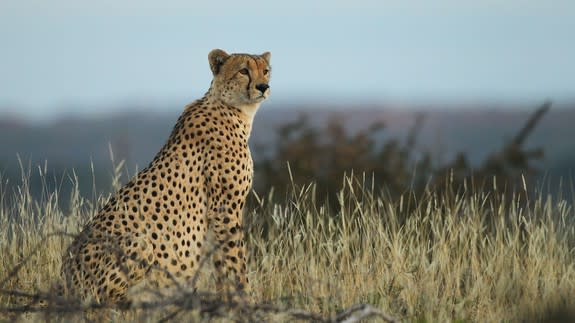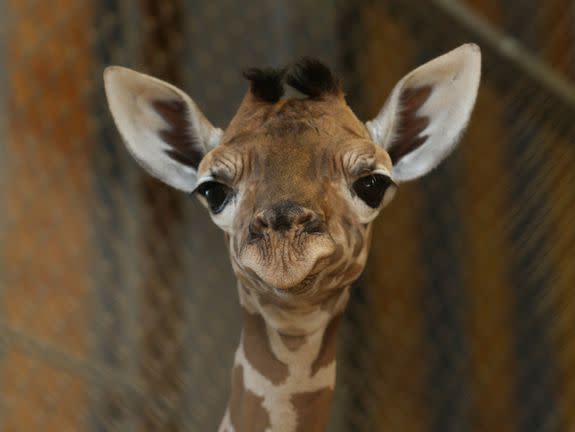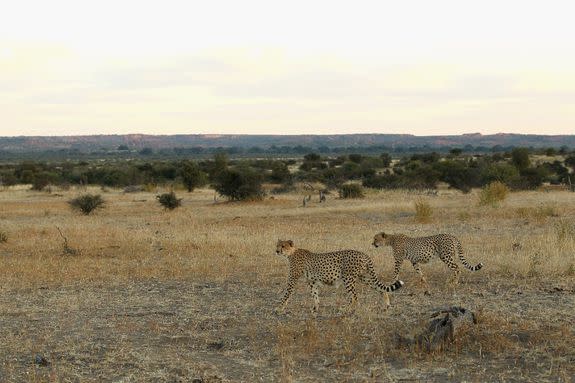The world's fastest land animal is even more threatened than we thought

Cheetahs, the world's fastest land animals, are racing to the edge of extinction, conservationists say.
Only about 7,100 cheetahs remain in the wild, according to a new analysis of the cheetah population. The carnivores have lost about 91 percent of their historic range in Africa and Asia.
Researchers said the latest figures show the cheetah may be more imperiled than previously thought.
SEE ALSO: Giant rats could help fight wildlife smuggling in Africa
"We've just hit the reset button in our understanding of how close cheetahs are to extinction," Kim Young-Overton, who directs the cheetah program at conservation group Panthera, said in a statement.
Panthera, the Wildlife Conservation Society and the Zoological Society of London led the cheetah research, which was published Monday in the journal Proceedings of the National Academy of Sciences.
The study follows similarly grim reports about other iconic species, such as giraffes and elephants.
In early December, a global group of conservationists and governments put giraffes on the official watch list of globally threatened and endangered species.
The world's tallest land animals are now considered "vulnerable" after their population shrank nearly 40 percent in just 30 years, from roughly 163,000 giraffes in 1985 to roughly 97,500 in 2015, according to the International Union for the Conservation of Nature (IUCN).
Scientists blamed habitat loss, poaching and disease for the giraffe's decline.

Image: Buddhika Weerasinghe/Getty Images
Elephants are also rapidly dwindling as poachers slaughter them for their tusks and humans encroach on the wild landscape. The IUCN in September adopted a resolution to ban all domestic ivory sales in an effort to save the pachyderms from extinction.
Cheetahs are similarly threatened by widespread habitat loss and illegal trafficking.
But conservationists say the lightning-fast cats are especially hard to protect because they roam stealthily across long distances that span multiple borders and government jurisdictions.
"Given the secretive nature of this elusive cat, it has been difficult to gather hard information on the species, leading to its plight being overlooked," Sarah Durant, the study's lead author, said in a news release.

Image: Cameron Spencer/Getty Images
Cheetahs are among the most wide-ranging carnivores, with documented home ranges of more than 3,000 square kilometers, or about 1,160 square miles.
The researchers found that over 75 percent of cheetahs' current range lies outside of officially protected areas. For cheetahs, this means most of the places where they hunt, breed and sleep are likely spots for habitat destruction, poaching, or the overhunting of cheetahs' prey.
Such threats have already had devastating consequences for cheetahs in Asia.
Cheetahs have been driven out of 98 percent of their historical range on the continent. Iran is now the only country with a known population of Asiatic Cheetahs, with fewer than 50 individuals spread across just three areas, researchers said.

Image: Win Mcnamee/Getty Images
The rest of the world's cheetahs live in Africa, where they face growing threats from rising human populations and land-use changes.
In Zimbabwe, for instance, about 85 percent of the country's cheetah population has disappeared in the last 16 years, from about 1,200 cheetahs to no more than 170, according to Monday's study.
Durant and her colleagues urged the IUCN to "up-list" the cheetah from "vulnerable" to "endangered" on its Red List of Threatened Species.
The move would put the cats just two steps away from being declared "extinct in the wild."
